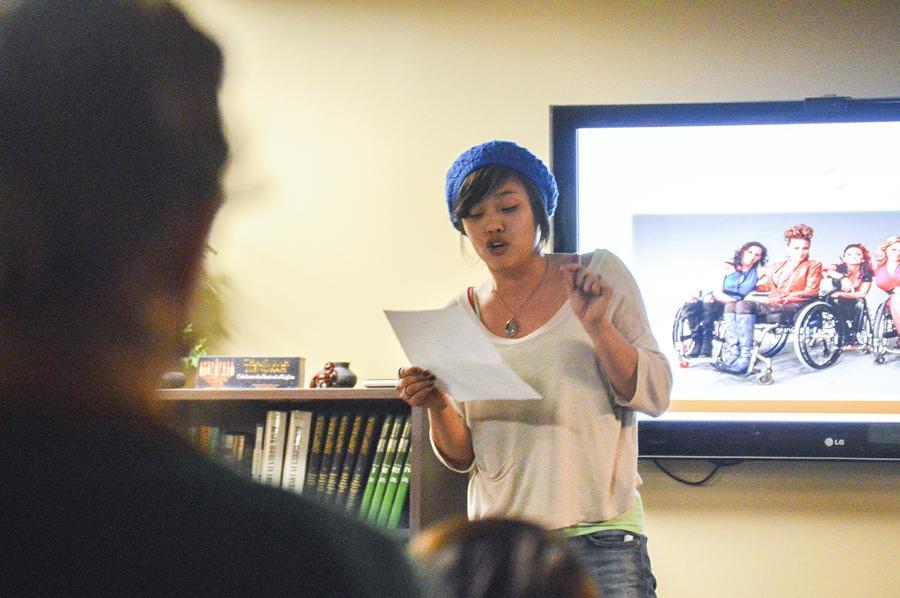
With [National Eating Disorder Awareness Week](http://nedawareness.org/) in full swing, several student organizations came together under the safe space of the Multicultural Center to share and engage in some body love and self-appreciation Wednesday night.
The event, a slam poetry open forum, was orchestrated by the MU Counseling Center’s Sonia Dhaliwal, and had a large turnout. More than a dozen students shared their stories.
“This year we thought it’d be fun to collaborate with the Multicultural Center again and have an event that’s empowering and inspiring for young men and women,” said Dhaliwal, who is celebrating her third year of involvement in NEDA Week.
The room was packed with students from all walks of life, ready to share and deconstruct negative body image on the brown and black couches and chairs.
Six students were on the original lineup, but by the end of the night, more than twelve prepared or improvised poems and stories, which were shared and received by roars of supportive snaps and cheers.
From darker, triggering topics to empowered and uplifting speeches, the Body Monologues shared a message of hope to anyone who suffers the destructive influences of media pressure, organizers said.
“The Body Monologues — what we do is promote a positive self-image of what your body is, whether it be that your body fits into what society deems is okay or not, we’re just making sure everybody loves their body regardless of how they were made,” Master of Ceremonies Candace Hicks said. “We’re just teaching people that they can express themselves however they want to, through poetry, through prose, through just spoken word and to just promote being happy with your body image.”
Dhaliwal said she hopes the forum opens up dialogue on a topic people don’t talk enough about.
The goal is to “create awareness about body image issues amongst men, amongst women, amongst the trans community,” she said. “Body image issues are prevalent on college campuses, so the more awareness we can create around it the better. I think it’s important to get dialogue started about it and reduce the stigma and guilt that’s sometimes associated with mental health issues.”
Poet Jenny Ane Herman shared a piece of her original work, titled _They Will Tell You_.
Inspired by the hope of empowering others to share, she took the stage: “Calories are mass marketed, diets are sold to the public like heroin, lifelines to a thinner body as drug dealing doctors revel in the public’s obsession with a smaller pant size.”
Herman said she is happy this event was hosted.
“Eating Disorder Awareness Week is really important to make sure that other people who are suffering know that they’re not alone and that everyone is aware that these issues are real,” Herman said.
The welcoming, supportive and casual atmosphere of the forum and the space encouraged students like Herman to open up and share their stories, she said.
Dhaliwal said the causes of eating disorders are numerous, but she often sees family environment and media messages causing unhealthy body images.
“Sometimes families can be important in the messages that they relay to their children, the environment that you’re in is very, very important, the messages that you get from your environment growing up,” she said. “But definitely the media plays a huge role. We’re constantly being bombarded by images that say you need to be better, you need to be prettier, you need to be thinner, more muscular. And so the question is, well, what’s good enough? And when will you be good enough? Then we have a culture of men and women that are just constantly striving to achieve something that is unattainable. And that can cause a whole host of issues.”
The goal of NEDA Week events and forums is to spread the message, create an open dialogue and help destigmatize mental health and mental disorders that plague a large percentage of the population, Hicks said.
“The media portrays a very strong image of what men and women should look like, a very strict body image for people and I think because of that reason, people form eating disorders and they look at themselves as less than,” Hicks said.
NEDA Week continues through Friday, but Dhaliwal said she encourages students to visit the Counseling Center at 119 Parker Hall anytime and take advance of Crisis Walk-In Hours.